Since the last weeks of 2019 the world is facing a new outbreak caused by the coronavirus SARS-CoV-2. This malady made an impact not only on the medical community but also on world economics. Organization for Economic Co-operation and Development (OECD) has already reduced world GDP growth prognosis for the 2020 year from 2.9% to 2.4% due to the coronavirus outbreak, so we decided to inspect an impact which COVID-19 is going to play on software development outsourcing services and related markets. We already can see how service proposals are changing to meet the emerging requirements for safety and reduce the effect of flight prohibitions in many countries. And working on this article we hope to successfully predict how things may go on.

How does it work
COVID-19 is not the first disease that can play an impact on world economics. And even not the first virus. The previous outbreak of SARS-CoV started in Southern China caused great losses from November 2002 to May 2004, as well as the 2009 flu pandemic and other viral epidemics, primarily with reducing international trade and spreading panics. That's why we have some data to make a prognosis, as well as a bunch of data already collected.
Over a month ago John Lonski the analytics expert of Moody's Analytics said that COVID-19 may be a so-called Black Swan. In this case, Black Swans are very rare and unpredictable events that dramatically affect economical and political processes such as 9/11. It makes sense of long-term impact prediction and expectations of the new opportunities emerging for companies with a flexible approach.
What did already happen?
On December 31, 2019, Chinese authorities reported about the new atypical pneumonia outbreak. And the next day there was the first economical loss: Huanan Seafood Wholesale Market in Wuhan which came under suspicion as a source of infection was closed. Quarantine measures in Hubei province caused an effect on stock exchanges in Hong Kong, Shanghai, and Shenzhen, where trading volumes began to fall on January 21. During the next several days stock markets dropped all around the world.
On Monday, 24 February 2020, the Dow Jones Industrial Average and FTSE 100 dropped more than 3% because COVID-19 widely spread outside Chinese mainlands. This tendency remained, so on February 27 were reported the largest stock falls since 2008. At the same time, decreased consumption of petroleum caused by flight prohibition and quarantine measures in China and Italy provoked the Russian–Saudi Arabian oil price war and the largest drop in oil rates since 1991.
And on March 9 was reported the largest global stock market crash already called Black Monday and expected to be a doorway for the New Great Depression. In several next days, predictions became less depressive but all experts say the same: we face a severe financial crisis amid the COVID-19 outbreak.

How COVID-19 changing world
Go Remote!
The most important part of overcoming COVID-19 is to keep working instead of panic. Some companies, mainly located in countries without many cases, limited their measures with the purchase of antiseptic agents and kindly ask to stay at home while feeling sick. But many companies have offices in places with the highest infection rates, as well as many people who were in China, Italy, and so on decided to isolate themselves for a few weeks and not put their colleagues at risk. That's why we face booming demand for remote cooperation software.
Since the beginning of the year, search queries such as 'online meeting software' are gaining popularity rapidly and becoming twice more popular than a year ago.
online meeting software search trends

What does it mean? At first, people keep working regardless of anything. Then, here is a goldmine for providers of such software and services. For example, Zoom.us increased its traffic 55 times.
Zoom.us traffic trends
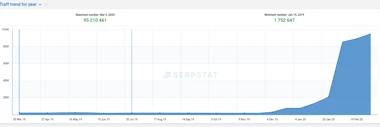
While Skype got 30x traffic growth.
Skype traffic trends

And gotomeeting.com increased the number of visitors 28 times.
gotomeeting traffic trends

If nothing happens and stops spreading the coronavirus, this trend may keep at least several more weeks until the vast majority of companies in the USA and Europe may switch to remote work. It also makes the great sense to launch your own webinar/remote meeting software as soon as possible because some teams which never used such tools before may adopt the first useful one and keep using it after the outbreak. Just as it always happens.
Celebrate eCommerce
What is the next idea to reduce the risk of infection after starting work remotely? Of course, it's shopping remotely! While megamalls become unsafe and the number of self-isolating people start growing, eCommerce boomed. In the United Kingdom, Post and Parcel say, part of household items and foods reached 40% instead of 20% in the previous period. In the United States, eCommerce providers also feel quite good. Traffic trends for Amazon and Walmart can be compared to online meeting tools.
Amazon traffic trends

Walmart traffic trends

The situation in Asia is more interesting. Even before COVID-19 countries like Singapour, Southern Korea, and Japan, as well as big cities in China, were extremely digitized. People there preferred online marketplaces for shopping while malls and boutiques were a kind of place to walk or party. And today people in Asia prefer to buy everything, even grocery, via eCommerce sites. In this case, Chinese food-delivery operator Meituan doubled sales compared to last year (may Google Translator be with you!).
No-Contact Delivery
One more innovation from China! Since COVID outbreak was reported, Chinese delivery services and eCommerce providers turned on an interesting option: so-called no-contact or handsfree delivery. This service allows receiving orders without any contact between customers and delivery persons. And it's getting quite popular around the world. For example, such service launched Ukrainian delivery service Raketa regardless of only several cases of COVID-19.
e-Learning
One more industry booming amid the COVID-19 outbreak is, obviously, eLearning while traditional schools and universities are locking down to reduce risks. But the growing popularity of e-Learning caused not only with the lessons broadcasting. While people got enough spare time, they decided not only to play video games and watch series but also to improve their skills. Which is fairly depicted with traffic trends of Coursera and Udemy.
Coursera traffic trends
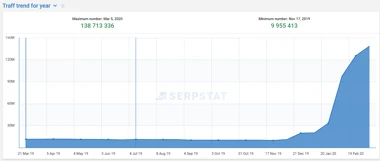
Udemy traffic trends
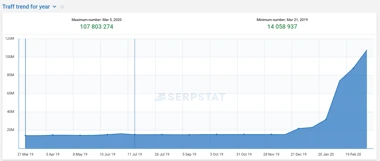
On the other hand, the demand for e-Learning is partly caused by strong promotion and really hard competition between the providers. Along with the dramatically growing competition in SERP, Google Ads, and targeted ads in social networks, bloggers and other influencers promote various courses (while working on this article, I’ve noticed at least 20 posts in Instagram and Facebook). All this situation means that eLearning has become one of the most beneficial industries.
Who knows, maybe online courses will become if not new petroleum but at least new big data during the outbreak.
e-Learning theme popularity
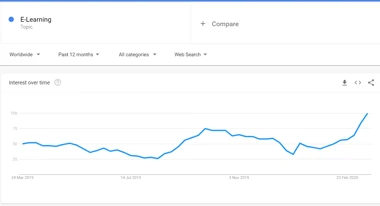
World Goes Remote...
The situation seems to be apocalyptic. Stock exchanges are falling, no flights, no tourism, no parties. But everything is far better than it looks. Like every crisis, the COVID-19 outbreak provides new opportunities for those who stay calm. For example, Apple won't postpone or cancel WWDC 2020 in June. As Phil Schiller, Apple’s senior vice president of Worldwide Marketing, says, the annual Worldwide Developers Conference in the 2020 year will run online. It seems to be the greatest online event with more than 23 million people who are about to join. People don't want to give up living full, so they run even metal shows online.
… and it’s awesome!
Regardless of any crisis, we keep working and help our Customers. As well as our Customers keep creating new products and solutions that fit new requirements. Building a remote collaboration strategy was a great thing even before COVID but today is essential while panic is worse than any malady. In UKAD we have a well-established remote work practice, enough courage and creativity to keep creating awesome things.
And we want to encourage you! We are on the verge of great changes. Day by day we see that events go online and the level of integration grows rapidly. It means a growing demand for eLearning solutions to help people study from home and gain new skills instead of dull seating behind the TV. It means a necessity to run live streaming of the sport and cultural events. It also requires re-establishment of eCommerce best practices and delivery rules. It's a great time to build a new strategy for the bountiful post-COVID era. Let’s do it together!

April 6th Update
COVID-19 seems to be a challenge not only to the global healthcare system but also to data security. The first casualty is Zoom - a meeting service that became extremely popular since the beginning of the outbreak. It was used by many non-tech people such as teachers running remote lessons, small-business owners and families, so malefactors got access to a huge load of sensitive data, including financial statements, personal details, phone numbers, diagnoses and children's faces. Today (Monday, 6th of April) Zooms was out of service for several hours and now is available again, but there are no concerns about its safety. Even more! Declarations about end-to-end calls encryption turned out to be fake: the 'end' was just a company's server instead of the user's device. So, terabytes of videos, voice calls, and text messages were placed on the Zoom's servers without any protection. And seems to be not safe still, so, if you're planning to use Zoom in the future for any reason, be sure you won't tell anything sensitive during the meeting.
April 24th Update
TrustRadius surveyed 2,168 buyers to discover how did COVID-19 outbreak impact on the software market. The survey shows that increased spends in March, caused by the necessity to have remote work tools, compensated with decreased spend on other kinds of software, and lesser budgets in April.
Stay tuned!
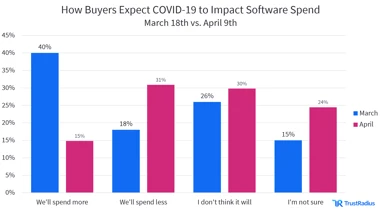
Contacts
-
Book a call with our USA team with our USA team -
Book a call with our EU team Book a call
with our EU team -
Whatsapp Talk to CEO Whatsapp
Talk to CEO -
Write to us hi@ukad-group.com Write to us
hi@ukad-group.com


